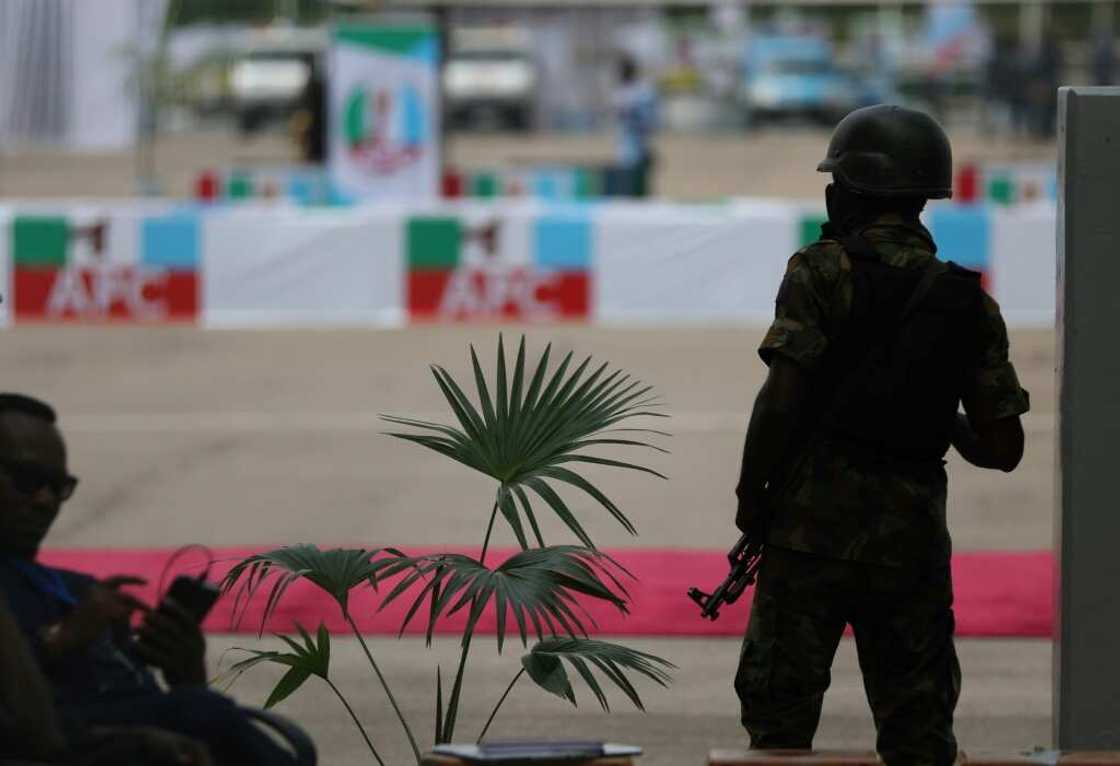Nigeria beefs up security after US, UK 'terror' warning

Source: AFP
PAY ATTENTION: Click “See First” under the “Following” tab to see Legit.ng News on your Facebook News Feed!
Nigeria on Friday said it had beefed up security and called for the public to be vigilant but calm after the United States and Britain warned of a high "terror" threat in the capital Abuja.
Without giving details on any specific threat, the US on Thursday ordered diplomats' families to leave Abuja due to what it called a "heightened risk of terrorist attacks."
Residents of the Federal Capital Territory (FCT) have been on high alert since Sunday, when several Western embassies changed their travel advisories citing an elevated risk of attack in Abuja.
Nigerian troops are fighting jihadist insurgents mostly in the northeast, though there are small cells in other parts of the country.
Militants linked to the Islamic state group claimed several attacks near the capital in the past six months, including a mass jailbreak in July.

Read also
Terror alert in Nigeria: Buhari finally reacts to travel advisory by US, UK, others over Abuja security threat
The incident in Kuje, in which more than 400 inmates including dozens of suspected jihadists escaped, had prompted Buhari to say he was "disappointed" with his intelligence services.
PAY ATTENTION: Subscribe to Digital Talk newsletter to receive must-know business stories and succeed BIG!
But since then, "security measures have been reinforced in and around the FCT," a statement from President Muhammadu Buhari's office said on Friday, citing "heightened monitoring and interception of terrorist communications."
"Terror is a reality the world over. However, it does not mean an attack in Abuja is imminent," it added.
The president said he gave his "assurances that the government is on top of the security situation."
"Attacks are being foiled. Security agents are proactively rooting out threats to keep citizens safe –- much of their work unseen and necessarily confidential."
While he ordered "additional precautionary measures be put in place," Buhari said that "the recent changes in travel advice from the US and UK governments should not be a cause for panic."
On Thursday, Nigerian police instructed "all strategic police managers in charge of commands and tactical formations within the country to beef up security in their respective jurisdictions, especially in the FCT."
Soft targets
The Inspector General of Police Usman Alkali Baba said "all emergency numbers" should be activated to help insure "a 24/7 prompt response with combatant officers and men on standby."
The statement came as the US State Department ordered the departure of diplomatic dependents from Abuja.
It initially said in a statement on Thursday that non-emergency government employees and their families had been ordered to leave. On Friday, the State Department clarified that the order to evacuate applied to families and not employees, who had however been authorised but not ordered to go.
"Terrorists may attack with little or no warning," targeting malls, markets, hotels, places of worship, restaurants, bars or schools, the State Department said in its country summary for Nigeria.
The United States, Britain, Australia and Canada had issued warnings last weekend, although the three latter countries had not ordered any evacuation of staff or their families as of Friday.
Separately, the US warned this week of a possible "terrorist" attack in South Africa's largest city Johannesburg.
Some European embassies and international organisations have not updated their risk assessments or travel advisories for Nigeria.
"We have no crisis to manage, we are managing the panic," a senior security manager with an international organisation based in Abuja told AFP, asking to remain anonymous.
"We don't know what the motive is (behind the US evacuation). We are taking some precautionary measures/actions, but activities are normal," he added.
On Thursday, Jabi Lake Mall, a major shopping centre in Abuja was temporarily shut down for unspecified security reasons.
Nigeria's military is stretched thin, with soldiers deployed throughout most of the West African nation of some 200 million people.
The last time a jihadist group -- Boko Haram -- attacked the city centre was in 2014.
In addition to the ongoing terrorism threat, the capital is also surrounded by states with rampant banditry -- gangs of gunmen who kidnap and kill with no ideological motivation.
Analysts have warned that insecurity could worsen with the start of political campaigning for the general election to replace Buhari next year.
Source: AFP





